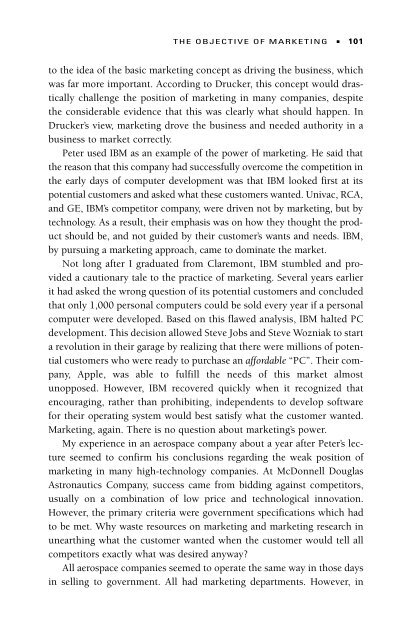A Class with Drucker - Headway | Work on yourself
A Class with Drucker - Headway | Work on yourself
A Class with Drucker - Headway | Work on yourself
You also want an ePaper? Increase the reach of your titles
YUMPU automatically turns print PDFs into web optimized ePapers that Google loves.
THE OBJECTIVE OF MARKETING ■ 101<br />
to the idea of the basic marketing c<strong>on</strong>cept as driving the business, which<br />
was far more important. According to <str<strong>on</strong>g>Drucker</str<strong>on</strong>g>, this c<strong>on</strong>cept would drastically<br />
challenge the positi<strong>on</strong> of marketing in many companies, despite<br />
the c<strong>on</strong>siderable evidence that this was clearly what should happen. In<br />
<str<strong>on</strong>g>Drucker</str<strong>on</strong>g>’s view, marketing drove the business and needed authority in a<br />
business to market correctly.<br />
Peter used IBM as an example of the power of marketing. He said that<br />
the reas<strong>on</strong> that this company had successfully overcome the competiti<strong>on</strong> in<br />
the early days of computer development was that IBM looked first at its<br />
potential customers and asked what these customers wanted. Univac, RCA,<br />
and GE, IBM’s competitor company, were driven not by marketing, but by<br />
technology. As a result, their emphasis was <strong>on</strong> how they thought the product<br />
should be, and not guided by their customer’s wants and needs. IBM,<br />
by pursuing a marketing approach, came to dominate the market.<br />
Not l<strong>on</strong>g after I graduated from Clarem<strong>on</strong>t, IBM stumbled and provided<br />
a cauti<strong>on</strong>ary tale to the practice of marketing. Several years earlier<br />
it had asked the wr<strong>on</strong>g questi<strong>on</strong> of its potential customers and c<strong>on</strong>cluded<br />
that <strong>on</strong>ly 1,000 pers<strong>on</strong>al computers could be sold every year if a pers<strong>on</strong>al<br />
computer were developed. Based <strong>on</strong> this flawed analysis, IBM halted PC<br />
development. This decisi<strong>on</strong> allowed Steve Jobs and Steve Wozniak to start<br />
a revoluti<strong>on</strong> in their garage by realizing that there were milli<strong>on</strong>s of potential<br />
customers who were ready to purchase an affordable “PC”. Their company,<br />
Apple, was able to fulfill the needs of this market almost<br />
unopposed. However, IBM recovered quickly when it recognized that<br />
encouraging, rather than prohibiting, independents to develop software<br />
for their operating system would best satisfy what the customer wanted.<br />
Marketing, again. There is no questi<strong>on</strong> about marketing’s power.<br />
My experience in an aerospace company about a year after Peter’s lecture<br />
seemed to c<strong>on</strong>firm his c<strong>on</strong>clusi<strong>on</strong>s regarding the weak positi<strong>on</strong> of<br />
marketing in many high-technology companies. At McD<strong>on</strong>nell Douglas<br />
Astr<strong>on</strong>autics Company, success came from bidding against competitors,<br />
usually <strong>on</strong> a combinati<strong>on</strong> of low price and technological innovati<strong>on</strong>.<br />
However, the primary criteria were government specificati<strong>on</strong>s which had<br />
to be met. Why waste resources <strong>on</strong> marketing and marketing research in<br />
unearthing what the customer wanted when the customer would tell all<br />
competitors exactly what was desired anyway?<br />
All aerospace companies seemed to operate the same way in those days<br />
in selling to government. All had marketing departments. However, in


